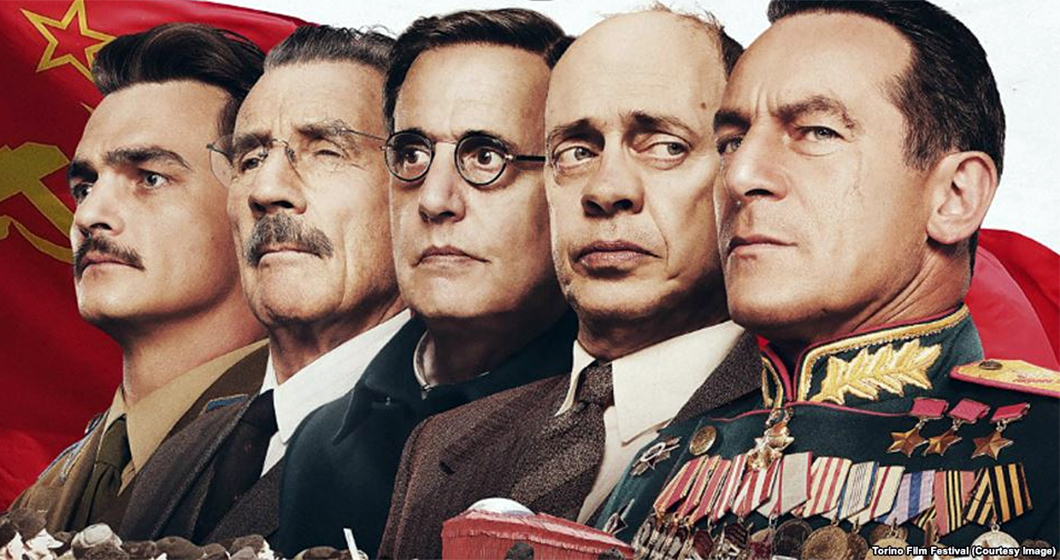The Death of Stalin is the extremely funny take on one of the most turbulent and violent periods of Russia’s long, turbulent, violent history. It’s an odd subject for a comic, but Armando Iannucci, best known for his very biting political satires The Thick of It and Veep takes on a difficult topic, and depicts it in a way that plays to his strengths and puts it squarely in his wheelhouse.
Stalin, in 1953, has let his long simmering paranoia boil over. There are daily proscriptions and executions. We’re constantly seeing the NKVD (the internal security service) hustling people out of their apartments and into trucks. It is the great terror, mostly overseen by Beria, Stalin’s attack dog. Stalin, however, after a traditionally endless banquet with his cabinet, suddenly drops dead. And his cabinet must figure out both the funeral and the succession.
Armando Iannucci made his name showing the absurdity, dim wittedness, selfishness and short sightedness behind the British government. He loves to show how even small amounts of power can corrupt. His characters are the sort of awful people that seek it out.
It’s a surprisingly perfect fit to depict this period of more literal political backstabbing the exact same way. While everyone in the room might have a very scary resume (and since the characters include Molotov, who has that famous cocktail named after him, that’s a safe assumption) years of paranoia and infighting, provoked and encouraged by Stalin, have left them a petty group of idiots constantly butting heads over nothing.
And it’s all too plausible. If this had come out, say, a year and a half ago, it would have seemed a bold, revolutionary take, or possibly have left it derided as being too farfetched. The last year of politics has removed that risk. It’s one thing to read historical accounts of how clique-y a political inner circle can be, it’s another thing to see it all play out live. And the one in this film doesn’t have the mitigating influence of democracy.
A system where everyone is constantly terrified of screwing up, or looking like they screwed up, is not an efficient system, it’s an absurd system where making sure the boss receives a recording on time is a matter of life and death. You can’t make mistakes, but you also can’t be too competent or quick, because that might be just as dangerous. And this permeates everything.
The film revels in the pettiness of the result, as these men fall over each other not to sound critical of Stalin, simultaneously agreeing that it was correct to condemn someone, but also correct to pardon them, making them simultaneously innocent and guilty. If you’ve read 1984, you might remember the interrogator insisting that a train is very small, and enforcing that absurd, mistaken belief because the state is infallible. The Death of Stalin is that scene played for grim laughs.
It’s tempting to compare this to Molly’s Game, which was also a feature film made by a well-regarded television writer. Iannucci has a much better sense of his own strengths. He’s at his best with powerful but flustered people swearing their heads off as best laid plans crumble, usually for very stupid reasons, and so he sticks to what he’s good at.
The film doesn’t have a good guy, really. It makes it clear that all these people are cast from the same mould but that Beria (played by an outstanding Simon Russel Beale) is a special kind of monster who knows where all the bodies are buried, and is constantly adding to them. The film works around the perpetual atrocities of the regime, but never leaves you in any doubt that they are occurring.
In opposition, you’re left with a bunch of people who are all very keen to appear to be the one good person in a flawed system, but who are all incapable of being it, whether through incompetence, personal failings, or cowardice. The film has little sympathy for them, and neither do we. As such, it’s great fun to watch them squirm. If they were more likable, or better people, it wouldn’t work as well as it does.
Helping that is the lack of accents. Everyone just does whatever accent they usually do, including the Americans (Jeffrey Tambor and Steve Buscemi). There isn’t a cartoonish Russian accent in sight. Most amusingly, Marshal Gregory Zhukov, the architect of the Battle of Stalingrad, four-time hero of the Soviet Union, terrifying historical hard-case and possibly the most Russian man ever, is played by Jason Isaacs with the broad Yorkshire accent you’d associate with puddings and flat caps.
There is a shift in tone late in the film. The jokes get put away, and it’s the serious, grim ending that a dynastic struggle always ends with, but, again, it works. For all the absurdity and jokes that run right through the film, the stakes have been high the whole time. Iannucci depicts the life and death struggle for the reins of a super-power the exact same way he depicts the slap fighting of a fictional government department, only the consequences are much steeper. The film is the product of a director who might only have one trick, but he knows it, and he’s really good at it.
8/10
Reviewed at Palace Electric






